Migration news: The year that was and the way forward
Angolan/South African visa exemptions
The Minister of Home Affairs announced recently that an accord had been reached between South Africa and Angola regarding which there would be a reciprocal automatic 90-day visa exemption granted to South African’s travelling to Angola and Angolans travelling to South Africa. The proviso is that in a one (1) year cycle, a maximum of 90 days is permissible regarding the agreement, subject to each visit not being longer than 30 days. Visas issued under this visa exemption accord are issued automatically upon arrival in the respective countries of South Africa and Angola. This bodes well for trade opportunities and travel and tourism with our neighbours.
New development in respect of Zimbabwean nationals that applied for the Zimbabwean exemption permit but whose applications have not been finalised by 31 December 2017
Holders of Zimbabwean special permits (ZSP) who qualify for and have applied timeously for the Zimbabwean exemption permit (ZEP) visas will be faced with the fact that their applications will not have been finalised by 31 December 2017 when the ZSP expire. The Department of Home Affairs has just now released a directive stating that holders of a ZSP who have applied for a ZEP visa and are in possession of a Visa Facilitation Service (VFS) receipt, proving lodgement of that application, may reside post the deadline of 31 December 2017, whether it be in respect of work, study, business or residence, pending the outcome of the ZEP application. All they need to do is carry the receipt issued by the ZEP VFS, which also bears the receipt for payment of the processing fee, with their passport. On that basis they can continue working, studying or residing in South Africa.
Also, the deadline for submissions of ZEP visas has been postponed to the end of February 2018. This gives holders of a ZSP a further window of opportunity to apply for the new ZEP.
The year that was
2017 has been a particularly difficult year regarding immigration and citizenship law. One of the characteristics of 2017 on the visa front was the increase in the amount of false and/or fraudulent visas that were being presented. Whilst attorneys who specialise in immigration law and deal with visas are subject to the jurisdiction and ethical and disciplinary codes and sanctions of the various statutory law societies, there is no requirement for persons outside of the legal profession to register as immigration practitioners and accordingly a whole industry has mushroomed in that regard where there is no accountability. The unfortunate reality is that many fly-by-night agents are doing weird and wonderful things in procuring the strangest visas. This does not detract from the small core of highly competent and efficient non-attorney immigration agents who do ply their trade.
The increasing number of ‘bad’ permits is concerning. Representations have been made in this regard to the Director-General of Home Affairs and the Minister of Home Affairs in the past. These all seem to have fallen on deaf ears. When the Forum of Immigration Practitioners of South Africa (FIPSA) was destroyed by an amendment in the Immigration Act, all remnants of accountability disappeared. A vibrant association with a large nationwide membership, assets in the form of money in the bank, an exam sanctioned and presented by the University of South Africa which could be written in literally any centre in the country, came to an end when Section 46(1) of the Immigration Act was excised from the Act in 2005. This was a great disappointment and pity as the association was well on the way to accreditation by the South African Qualifications Authority (SAQA) at the time and a course was being prepared that would have been SAQA accredited, had legislation still permitted it. Hopefully, in the coming year this matter will be looked into as incredible hardships have been caused to many families who believed they had obtained regular and proper visas but are faced with the exact opposite.
The Department of Home Affairs continues to be plagued by huge backlogs and delays. This situation is further complicated by a rise in the number of totally incorrect decisions made by the adjudication teams and where applications were refused incorrectly and improperly. Hopefully the new minister will look into this aspect also.
A further complication that has arisen is that the aggrieved applicant has only two choices where an incorrect decision has been made. The first is to apply afresh, mostly on the same documentation. The second is to apply to the Director-General of Home Affairs for a review in terms of Section 8(4) of the Act. The problem with the latter option is that, despite a cabinet directive that review and appeal applications should be finalised within eight weeks, many applications have been outstanding for six months to a year or longer, thereby leaving the applicants in limbo. If the purpose of our immigration laws is to attract, among other things, skilled foreigners, this becomes a travesty of the system.
A further note is that the Director-General of Home Affairs has an inherent digression to consider any petition for a waiver of various of the requirements set out in the regulations appended to the Immigration Act. The difficulty is the large backlog in the processing of waiver applications and that it is impossible to predict how long a waiver application will take. This sometimes negates the whole rationale for even applying for a visa or considering an overseas applicant for a position. It must be remembered that we do not have an infinite pool of resources or skills and steps should be taken to retain or acquire skills that are simply not available in South Africa. The first choice must always be to employ a South African citizen, but the reality is that certain skills sometimes are simply not available or being produced within South Africa.
On a final note, one of the bigger difficulties is to get an official to respond to an e-mail. This gets compounded further by whether a telephone will be answered. Bear in mind that telefaxes no longer are the fashion and it is therefore impossible to know whether a message has been received. When no response if forthcoming, the only assumption that can be made is that the e-mail is being ignored and is not going to be responded to. This creates a huge difficulty in this regard.
The way forward
South Africa remains part of the global village and not just part of this continent. The reality of the future is that special skills, and indeed skills in general, are in demand and transferrable. Countries that require skills are facilitating the importation of such skills by making it attractive and administratively reasonably easy for a highly skilled national to obtain the relevant work visas. Hopefully in the coming year, with the formulation of new immigration policy and being faced with a new immigration act or an amendment to the current Act plus new regulations, this will be considered.
Should you have any queries relating to immigration or citizenship issues, please do not hesitate to contact our office at enquiries@immigration.org.za. In the subject line, write ‘GI – Worldwide Spotlight visa enquiry’.
Julian Pokroy
Specialist Immigration Attorney
Share on
Latest articles




















